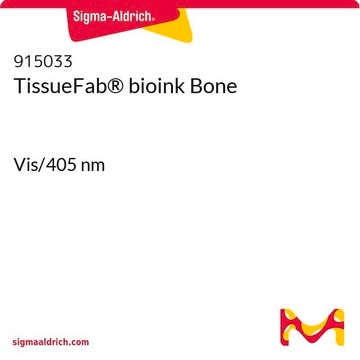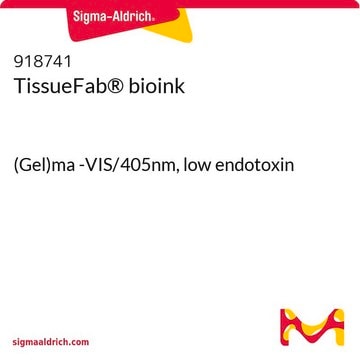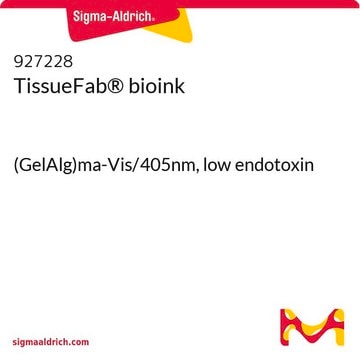920975
TissueFab® bioink
(GelAlgHA)ma -UV/365 nm
Synonym(e):
AlgMA, Alginate, Bioink, GelMA, Gelatin, HAMA, Hyaluronic acid
About This Item
Empfohlene Produkte
Qualitätsniveau
Beschreibung
suitable for 3D bioprinting applications
Sterilität
sterile-filtered
Form
viscous liquid (or gel)
Verunreinigungen
<5 CFU/g Bioburden (Fungal)
<5 CFU/g Bioburden (Total Aerobic)
Farbe
colorless to pale yellow
Partikelgröße
0.2 μm
pH-Wert
(6.5-7.5)
Anwendung(en)
3D bioprinting
Lagertemp.
2-8°C
Suchen Sie nach ähnlichen Produkten? Aufrufen Leitfaden zum Produktvergleich
Verwandte Kategorien
Anwendung
This bioink is derived from natural polymers − hyaluronic acid, alginate and gelatin. Hyaluronic acid is also known as sodium hyaluronate or hyaluronan, is an anionic, nonsulfated glycosaminoglycan (GAG). Alginate also known as sodium alginate or alginic acid, is a natural biopolymer obtained from brown algae. Alginate is a natural polysaccharide widely used in tissue engineering. Gelatin contains bioactive peptide sequences similar to native extracellular matrix which promotes integrin mediated cell adhesion and MMP sensitive enzymatic degradation which are essential for cellular functions such as migration, proliferation and differentiation.
Leistungsmerkmale und Vorteile
- Ready-to-use formulation optimized for high printing fidelity and cell viability, eliminating the lengthy bioink formulation development process
- Step-by-step protocols developed and tested by MilliporeSigma 3D Bioprinting Scientists, no prior 3D bioprinting experience needed
- Suitable for different extrusion-based 3D bioprinter model
Verpackung
Rechtliche Hinweise
Lagerklassenschlüssel
10 - Combustible liquids
WGK
WGK 3
Analysenzertifikate (COA)
Suchen Sie nach Analysenzertifikate (COA), indem Sie die Lot-/Chargennummer des Produkts eingeben. Lot- und Chargennummern sind auf dem Produktetikett hinter den Wörtern ‘Lot’ oder ‘Batch’ (Lot oder Charge) zu finden.
Besitzen Sie dieses Produkt bereits?
In der Dokumentenbibliothek finden Sie die Dokumentation zu den Produkten, die Sie kürzlich erworben haben.
Artikel
Biotinten können im 3D-Bioprinting-Verfahren zu funktionalen Gewebekonstrukten für das Wirkstoffscreening, die Krankheitsmodellierung und die In-vitro-Transplantation hergestellt werden. Wählen Sie die Biotinten und die Methode für spezifische Anwendungen in der Gewebezüchtung aus.
Bioinks enable 3D bioprinting of tissue constructs for drug screening and transplantation; select suitable bioinks for specific tissue engineering.
Learn how 3D bioprinting is revolutionizing drug discovery with highly-controllable cell co-culture, printable biomaterials, and its potential to simulate tissues and organs. This review paper also compares 3D bioprinting to other advanced biomimetic techniques such as organoids and organ chips.
Unser Team von Wissenschaftlern verfügt über Erfahrung in allen Forschungsbereichen einschließlich Life Science, Materialwissenschaften, chemischer Synthese, Chromatographie, Analytik und vielen mehr..
Setzen Sie sich mit dem technischen Dienst in Verbindung.
